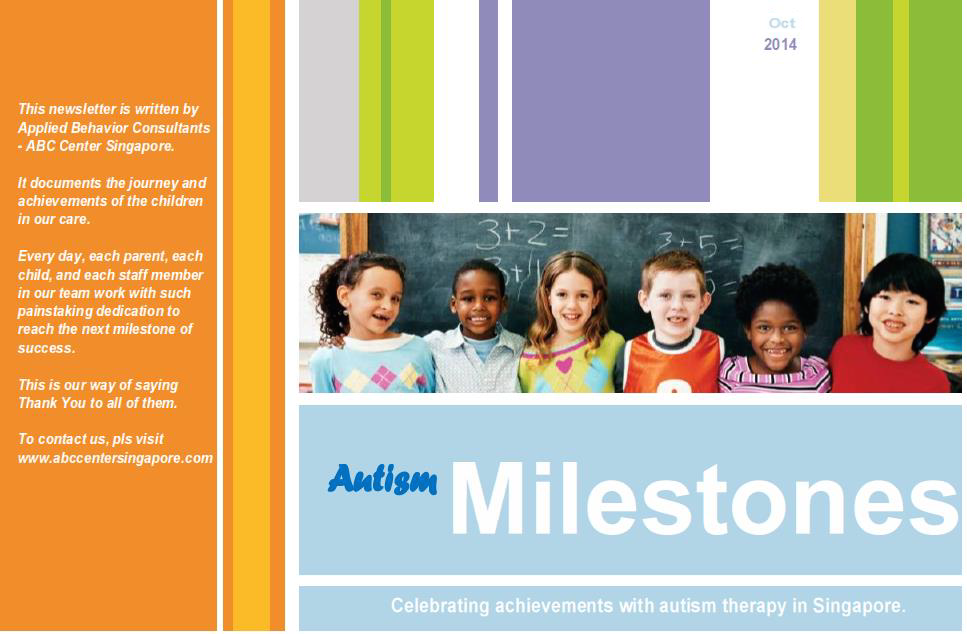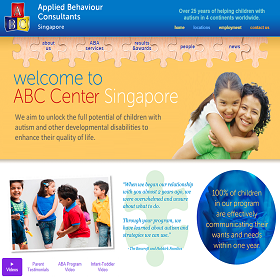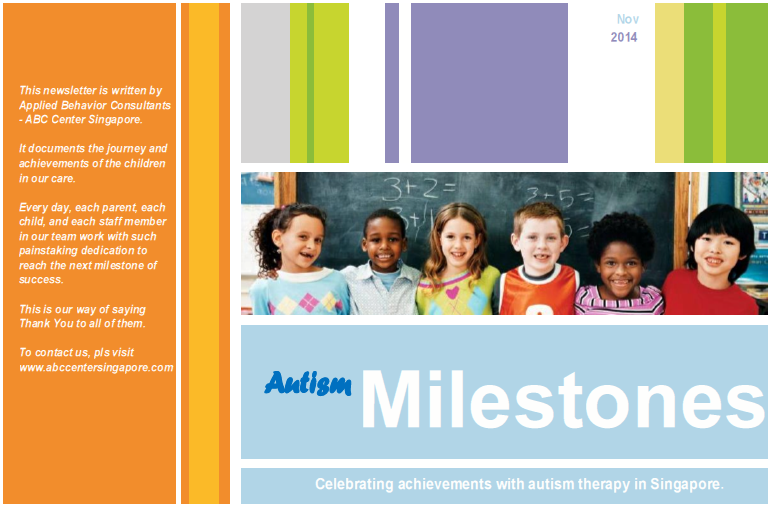
While the upcoming festive season is a time for celebration with family and friends, it can be stressful for those caring for children with autism due to many reasons – changes in routine, travel, unfamiliar social interactions. However, ABC Center Singapore’s Clinical Site Administrator, Ms Hui Ling Loh, MA, BCBA, sees this season as a great opportunity to help children progress even more. In this newsletter, she gives her advice to enable this.
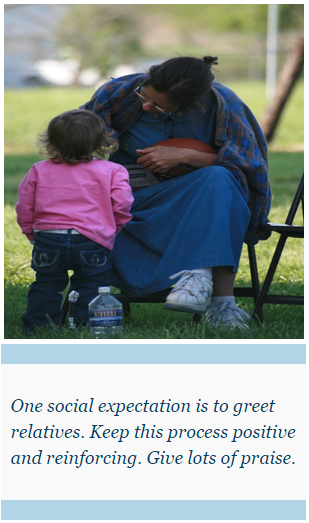 During the festive season, there is a lot of social interaction with people who are unfamiliar to a child – distant uncles and aunts, for instance. How do we best prepare a child with autism for these situations?
During the festive season, there is a lot of social interaction with people who are unfamiliar to a child – distant uncles and aunts, for instance. How do we best prepare a child with autism for these situations?
HLL: Make the interaction positive. One important social expectation is to politely greet relatives hello. To do this, we slowly ‘shape’ the behavior, teaching the child one step a time to get him comfortable. For example, the first time the child meets a distant relative, you praise him even for just making eye contact. Then once the child is comfortable, you progress to asking the child to wave his hand hello, and praise that. Once he is ready to progress, you ask him to say ‘Hello’ vocally. Later on, he moves on to saying a complete ‘Hello Auntie Rose’.
To help your child be ready, ask your behavior analyst what your child’s current skill level is. For example, if your child has learned to wave when told to greet people, you can prompt your child to wave at Auntie Rose when she says hello. Encourage this behavior by praising after he/she waves.
It is important for the process to be seen positively by the child. Don’t push for too much too early. Give lots of praise. Even for typical children, it takes time to warm up to unfamiliar relatives, so keep the process positive and reinforcing.
When going to gatherings, many things are different from the usual routine (where to eat, sit, who they are with). How do we prepare a child for these?
HLL: For children on a special diet, parents should come to the gathering prepared with the food that his/her child eats. As for the other changes, particularly if you know your child does not deal with routine changes easily, tell your child beforehand what to expect (eg who will be there, how many people, where they will eat, etc). This helps him anticipate the change well.
Should a parent try to make these situations more familiar (eg. bring own cutlery, only expose to familiar people)?
HLL: Parents should use the opportunity to expose the child to the novelty of social gatherings, rather than working too hard to make it familiar. Maximize the learning by using the new situation to teach, and praise your child for acceptance.
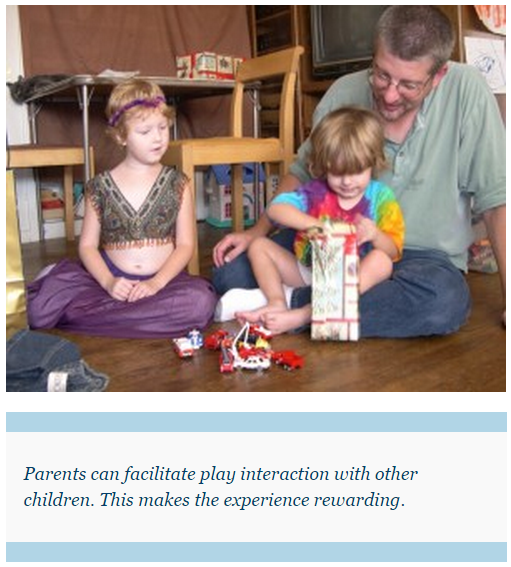 How do you enable your child to properly play and interact with other children?
How do you enable your child to properly play and interact with other children?
HLL: This highly depends on the age and skill level of the child. For young children or those who are not used to playing with others, parallel play is good enough. Have your child sit alongside the group to play with his toys beside the others.
For those with higher skills, parents can definitely facilitate playing with other children. For instance, after bringing the child to join the group, the parent can help explain the game, then ask the child to help pass a toy, toss a ball, wait for his turn etc. This will make the experience a rewarding one for your child.
Some children have a sensitivity to sounds and lights, like fireworks during the holidays, how do we handle these?
HLL: This will require some planning by the parent. For those with sound sensitivity, bring noise-blocking headphones. Nowadays, this type of headphones is commonly available and commonly used, so it will not look out of place in a social situation. This way, the child can still enjoy the lights of the fireworks, while not being bothered by the sound. For those sensitive to light, ask the host which area of the house will not have too much visibility to the light, and then engage the child with activities in this area while the fireworks are happening.
Some families do a trip abroad during this season, what would you advise to make this successful?
HLL: Prepare the child prior to the trip. ABC Center can help do this through social stories – ie. creating stories regarding the places to be visited, and what is to be expected there. For example, if the holiday includes going to museums, we teach the child what a museum is, what he will see, what he will do, what the expectations are (eg. everyone is expected to be quiet). Then we teach the child how to appropriately communicate and ask for what he needs in this context – eg. he can ask to play with the ipad if he is bored, or he can ask for a snack break, or he can properly request to leave. These are appropriate ways to deal with any potential anxiety, and the child will be better equipped if these are planned ahead of time.
Once the trip is in progress, the parent can also bring the same social story materials to their travel, so that he/she can reiterate the lessons on the day right before going to the museum.
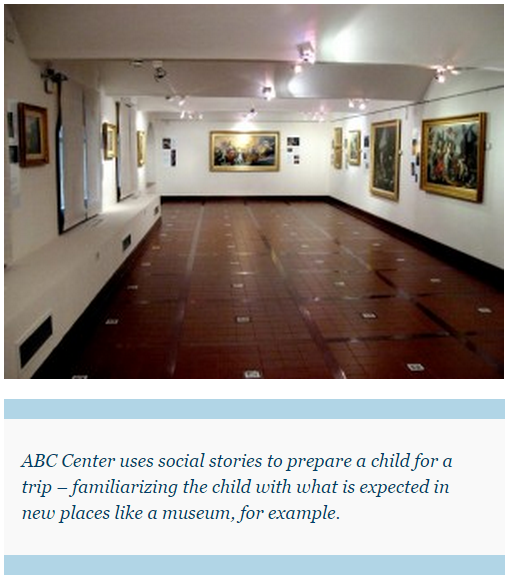 During the holiday trip, the child also stops doing his scheduled therapies for a few days/weeks. Is there a maximum length you would recommend for these holidays?
During the holiday trip, the child also stops doing his scheduled therapies for a few days/weeks. Is there a maximum length you would recommend for these holidays?
HLL: Each family should enjoy the holiday but should not let it affect the progress of the child. It is hard to give a maximum length as this is dependent on the progress of the child. In general, it is important for teaching to still occur daily, if not in formal therapy sessions, then via incidental teaching by the parent.
Another important point is for the child to regularly practice skills already learned. For example, if he knows how to say hello, ensure this happens regularly while on holiday. If he knows how to use words or PECS (Picture Exchange Communication System), this should continue (and therefore the parent should bring the child’s PECS book). If the child already knows how to follow instructions, then the parent should have him help with small tasks during the trip.
What is the best way for a parent to do incidental teaching?
HLL: First, the parent has to be very aware of the current skill level of his/her child. The parents at ABC Center are generally aware because these are in our Communication Logs and Progress Reports.
Then the parent should research ahead of time what activities his/her child can do in the places to be visited (are there playgrounds? exhibits?). But even simple situations can lead to good incidental teaching moments — while walking down the street, play simple games (I spy the color blue), or just ask simple questions (which tree is taller, the one at the right or the one at the left). There are countless opportunities for incidental teaching if the parent is engaged and makes the effort.
Have you seen situations where the child loses a few skills after having gone on holiday?
HLL: Yes, I have seen this happen, specially if the child was not meaningfully occupied while on holiday. Some children lose a few skills, usually those not yet fully mastered before the holiday, or those they had no opportunity to practice. We also sometimes see a higher incidence of behavior excesses. The key is to keep teaching your child actively while on holiday. Speak to your behavior analyst on how to do this for your child so that his/her progress continues. At ABC Center Singapore, our results show that 100% of children make progress through our program, so our behavior analyst can definitely give you advice.
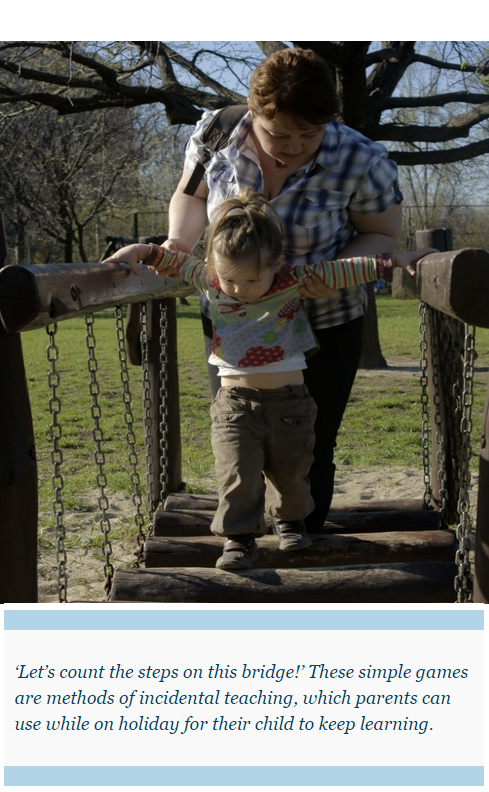 For many children in Singapore, a helper or nanny handles the daily basics of getting the child ready (bathing, brushing teeth, washing hands). If helper or nanny is not present during the holiday, how do we ensure this is a smooth process?
For many children in Singapore, a helper or nanny handles the daily basics of getting the child ready (bathing, brushing teeth, washing hands). If helper or nanny is not present during the holiday, how do we ensure this is a smooth process?
HLL: In fact, this is an excellent opportunity for the child to be more independent. Many times, we see children already able to do many skills (eg feed themselves, wash their own hands), but the helper or nanny still do it for them at home. Parents should become familiar with what their children can already do, then give them the chance to practice and master these skills during the holiday. Give limited help and try to make them as independent as possible. I know this means it might take longer to get ready, but as long as this is factored while planning then, it should be fine.
After a holiday, how do you get them readjusted back to the usual routine?
HLL: We sometimes see children having trouble readjusting back to a structured routine where they have to work and study hard. But I must say, that is typical for everybody. We all feel a little sluggish on the first day back to work after a holiday, don’t we? At ABC, on the first day back, we start them off relatively easier – ie. we first review tasks they have already mastered, so this builds up their behavior momentum. The good thing at ABC is that most kids are actually excited to be back, and this creates a positive momentum for them.
Any final words of advice for parents?
HLL: Enjoy the festive season. It’s a great time to connect as a family. It is also a great opportunity for your child to learn new things. Make the effort to keep teaching your child during this season, or speak to your behavior analyst on how you can stay connected while on holiday. This will keep your child progressing smoothly.
ABC CENTER SINGAPORE is part of the global network of Applied Behavior Consultants – a global entity that has been serving children with autism for over 25 years in 4 continents worldwide. Our early intervention services include 1 on 1 ABA therapy , Infant/Toddler 1on1 ABA Program, well as our EarlyPreps group preschool program.
Our EarlyPreps group preschool is the only ABA-based program within the Singapore MSF PPIP program where Singaporean/PR children who meet requirements may apply for financial subsidy.
To contact ABC Center (Applied Behavior Consultants) Singapore, please see www.abccentersingapore.com or call (65) 94236248
BACK TO ABC CENTER SINGAPORE HOME PAGE


